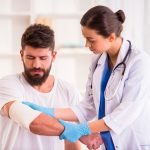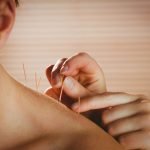In a recent study, a team of researchers showed that using virtual reality headsets can alter the experience of pain and pain memories while undergoing dental procedures.1 At a dental clinic in Devon, England routine dental procedures were shown to have less distress associated with them when patients utilized a virtual reality headset during the procedure.
Test Groups
Patients were put into 1 of 3 test groups: 1) a standard procedural scenario, 2) virtual reality headset used during the procedure, with a virtual walk around a beach, 3) a virtual reality walk around an anonymous city. The results showed that those who walked around the virtual beach were less anxious, experienced less pain, and hand positive recollections of the treatment a week later. These same effects were not seen in the virtual city or the standard procedure group.
Virtual Reality Increasingly Being Used in Procedural Settings
Virtual reality is increasingly being used in procedural settings within the medical field. As the technology becomes more and more accessible, it is likely this trend will continue. Research is showing that the type of environments of the virtual reality experience are important, with natural environments showing the greatest effects on stress and anxiety. Marine, or “seaside” seem to have the most favorable impact. This may be because most people experience a decrease in stress and anxiety at seaside.
VR More Readily Available to Mass Public
Virtual reality technology is becoming more readily available to the mass public, and it is likely that soon patients will be able to simply bring their own devices with them to a procedure, much like they bring headphones currently. This may be an incredibly cost effective and beneficial method to increase outcomes and satisfaction in all sorts of medical procedures, especially those with which a high rate of stress is associated.
- Tanja-dijkstra K, Pahl S, White MP, et al. Can virtual nature improve patient experiences and memories of dental treatment? A study protocol for a randomized controlled trial. Trials. 2014;15:90.
Image Copyright: <a href=’https://www.123rf.com/profile_wavebreakmediamicro’>wavebreakmediamicro / 123RF Stock Photo</a>
 Node Smith, associate editor for NDNR, is a fifth year naturopathic medical student at NUNM, where he has been instrumental in maintaining a firm connection to the philosophy and heritage of naturopathic medicine amongst the next generation of docs. He helped found the first multi-generational experiential retreat, which brings elders, alumni, and students together for a weekend campout where naturopathic medicine and medical philosophy are experienced in nature. Three years ago he helped found the non-profit, Association for Naturopathic ReVitalization (ANR), for which he serves as the board chairman. ANR has a mission to inspire health practitioners to embody the naturopathic principles through experiential education. Node also has a firm belief that the next era of naturopathic medicine will see a resurgence of in-patient facilities which use fasting, earthing, hydrotherapy and homeopathy to bring people back from chronic diseases of modern living; he is involved in numerous conversations and projects to bring about this vision.
Node Smith, associate editor for NDNR, is a fifth year naturopathic medical student at NUNM, where he has been instrumental in maintaining a firm connection to the philosophy and heritage of naturopathic medicine amongst the next generation of docs. He helped found the first multi-generational experiential retreat, which brings elders, alumni, and students together for a weekend campout where naturopathic medicine and medical philosophy are experienced in nature. Three years ago he helped found the non-profit, Association for Naturopathic ReVitalization (ANR), for which he serves as the board chairman. ANR has a mission to inspire health practitioners to embody the naturopathic principles through experiential education. Node also has a firm belief that the next era of naturopathic medicine will see a resurgence of in-patient facilities which use fasting, earthing, hydrotherapy and homeopathy to bring people back from chronic diseases of modern living; he is involved in numerous conversations and projects to bring about this vision.





